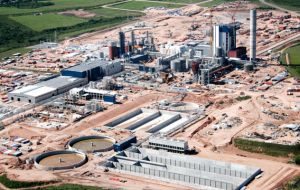MercoPress. South Atlantic News Agency
New York round of Uruguay/Argentina pulp mill dispute
 Orion - Botnia pulp mill update
Orion - Botnia pulp mill update Uruguayan and Argentine delegations held a technical meeting Tuesday in New York under the “dialogue facilitating” efforts of the Spanish Crown in an attempt to find a way out to the bilateral controversy over the building of a pulp mill on the Uruguayan shore of a shared river.
The meeting took place at the offices of the Spanish ambassador before United Nations and who is acting as "dialogue facilitator", Juan Anotino Yañez Barnuevo, specially named for the task by King Juan Carlos. The previous meeting was essentially political and held in Madrid, where the framework for the discussions and a basic agenda was agreed. Ambassador Yañez Barnuevo at the end of the first day of talks in New York praised both delegations for their "attitude" and "commitment" in trying to find a way out to the controversy. However in spite of the praise, according to statements in Buenos Aires and Montevideo, before the delegations left for New York, both countries remain steadfast in their positions. Argentina insists in the relocation of the Botnia pulp mill built in Fray Bentos, just across from Gualeguaychu in Argentina, where the more radical protestors are focused and have been blocking access to the international bridge which links with Uruguay. Uruguay refuses to accept relocation, mainly because the plant is almost finished and has begun production trials, and does not consider the current talks "negotiations" until the pickets blocking the bridges leading to Uruguay are cleared. The Uruguayan delegation will also be presenting a report titled "Contaminated Argentina" with a long 20 year history of pulp mills contamination in the neighboring country. The framework agenda which was agreed in Madrid and is currently under discussion has four basic points: the Orion Botnia project, including relocation and other relevant issues; movement along the routes and bridges linking both countries; the River Uruguay statute dating back to 1975 and which regulates the joint administration of the river that acts as a natural border between the two countries and finally the environmental protection of the River Uruguay and promoting sustainable development in its areas of influence.




Top Comments
Disclaimer & comment rulesCommenting for this story is now closed.
If you have a Facebook account, become a fan and comment on our Facebook Page!